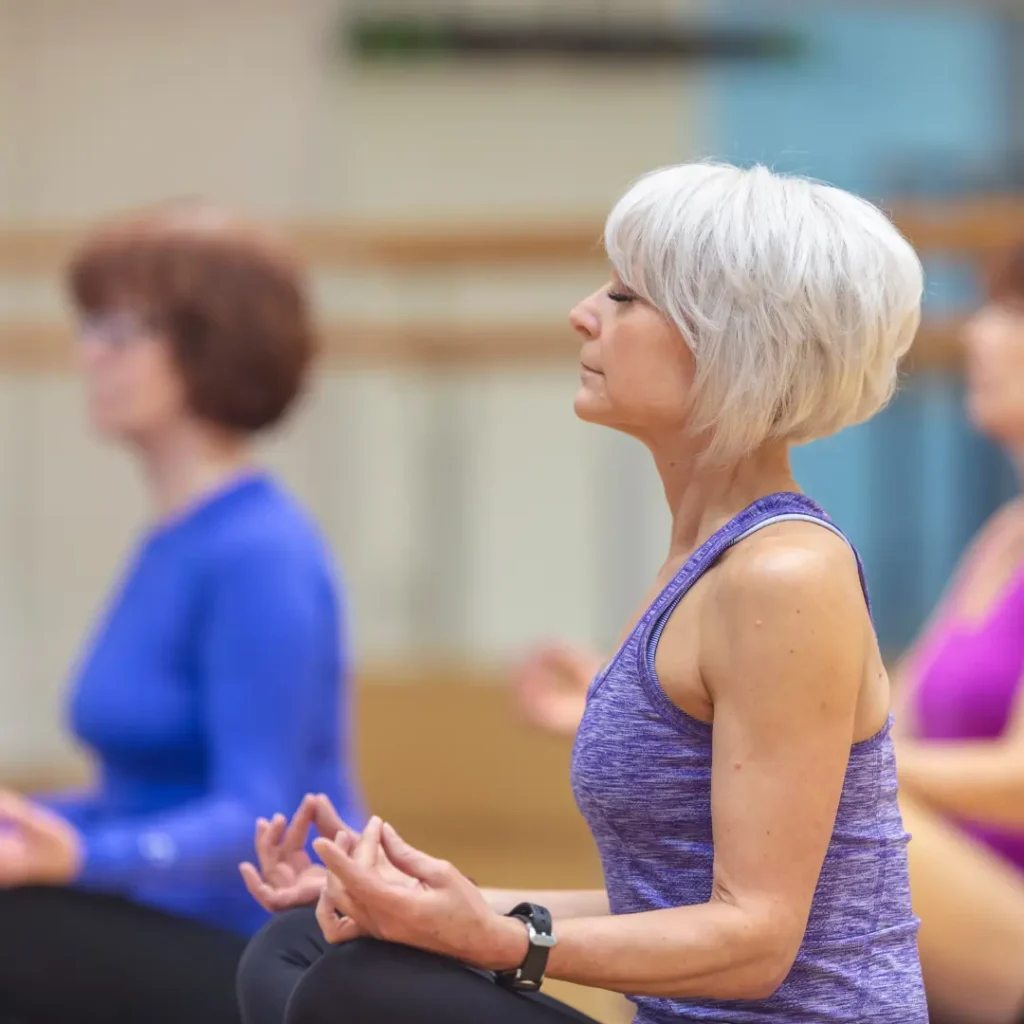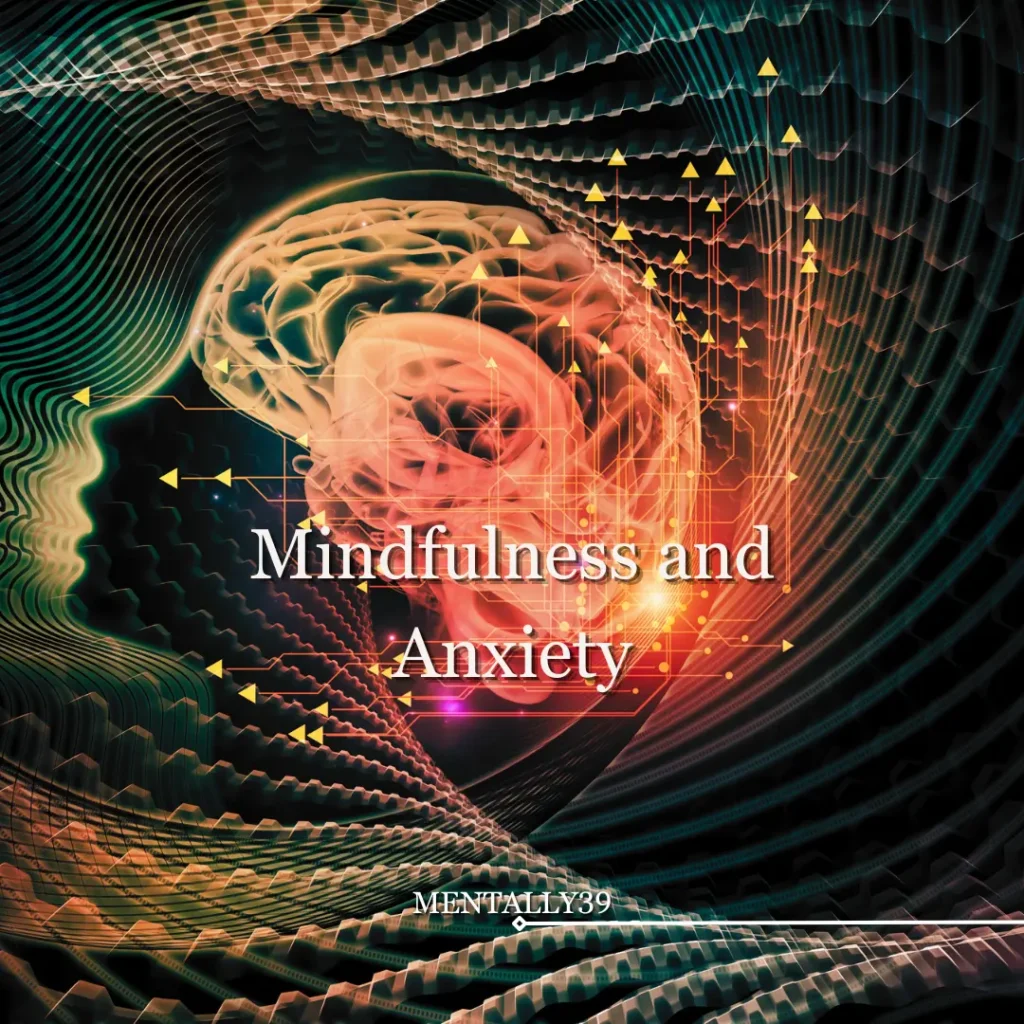I spent a lot of time out in the woods when I was younger. Whether it was hunting or walking with my camera. I was focused only on being quiet and seeing or hearing what I could. Turns out that what I was doing was being mindful. I was aware of my surroundings, listening, taking in the smells, etc. I always found those times calming, and it makes sense. Our lives can feel so hectic, and anxiety often seems to be right on our heels. Think of mindfulness as a peaceful shelter in a stormy world. It teaches us to live in the present moment, keeping our thoughts from drifting into worry-filled territory.
Mindfulness can help us reduce the endless strain of anxiety. It prepares us to handle life’s pressures with more ease. Starting this practice can change how we see and handle our anxious feelings. It moves us from being overwhelmed by anxiety to managing it with peace.
Key Takeaways
- Understanding the role of mindfulness in anxiety reduction and stress management.
- Exploring Mindfulness-Based Stress Reduction (MBSR) as a structured approach to coping with stress.
- Recognizing the benefits of present-moment awareness for inner stillness and clarity.
- Discovering how mindfulness practices can decrease the intensity of stress habits.
- Appreciating the significance of non-reactivity to discomfort as a means of dissipating anxiety.
- Identifying evidence-based research backing the positive effects of mindfulness on mental health.
The Connection Between Mindfulness and Anxiety
The link between mindfulness-based interventions and reducing anxiety is well known. Mindfulness helps us recognize and accept stress. It stops us from reacting impulsively, which can make stress worse. Mindfulness-based stress reduction (MBSR) uses this idea to help with anxiety. A lot of studies back it.
Studies have shown how MBSR helps. It teaches people to see stress in a new way, which can change how they feel about anxiety. Mindfulness-based cognitive therapy (MBCT) also helps with anxiety and preventing depression from coming back.
- Mindfulness-based stress reduction shows the power of mindfulness in dealing with anxiety.
- Studies prove that mindfulness can help people keep their distance from what stresses them.
- Mindfulness-based cognitive therapy is good at stopping depression from returning and handling anxiety.
- The success of mindfulness-based methods is in changing how we react to stress and building up our resilience against anxiety.
Mindfulness therapies teach us that fighting anxiety isn’t about suppression. It’s about creating a space where stress can be noticed, understood, and managed effectively. By following mindfulness-based therapy, people learn to get through anxious times and grow stronger from them.
The Core Principles of Mindfulness Meditation
The essence of mindfulness meditation is about being non-judgmental and living in the now. It teaches us to welcome all experiences with openness. This way, we can connect deeply with our feelings and the world around us. It leads to powerful insights and peace, even when chaos surrounds us.
Being Fully Present: A Path to Awareness
Being fully present is key to mindfulness. It lets us dive deep into the moments we’re living. This focus prevents our minds from wandering, bringing a sharp awareness. We see our thoughts and feelings just as they are. This removes the bias of the past or fears of the future. It shows us the beauty of now.
The Significance of Non-Judgmental Awareness
Mindfulness and meditation for anxiety teach us to see our experiences without judging them. They encourage us to look at our thoughts and feelings with kindness, creating a safe space for self-understanding. By doing this, we become kinder to ourselves. Mindfulness helps us experience life in a real way, enhancing the benefits of mindfulness.
Embracing Stillness and Inner Wisdom
In the quiet of mindfulness, we can hear our inner truth. This practice brings quiet, letting important insights come through. By paying close attention, we learn about ourselves. We find clarity and direction within. This knowledge helps us navigate life’s challenges better.
Embracing Mindfulness-Based Stress Reduction (MBSR)
Mindfulness-based stress reduction training is a program that can help you achieve inner peace. It provides practical tools to manage stress and anxiety, including simple mindfulness exercises. The program encourages you to use mindfulness in your daily life, which can help you deal with anxiety in a responsible and compassionate way. By undertaking this training, you will be able to manage your stress levels more effectively and feel more relaxed.
Jon Kabat-Zinn created MBSR. It’s more than just therapy; it’s a way to build formal mindfulness habits. Studies, including those in the American Journal of Psychiatry, show MBSR’s success in reducing anxiety measures and anxiety symptoms, especially in panic disorders. These findings highlight the value of mastering the management of stress through mindfulness.
- Deepened awareness of one’s stress signals.
- A structured 8-week approach to face daily stressors.
- A non-judgmental attitude towards oneself and stress.
- Notable decrease in the intensity of stress and anxiety.
Those who join MBSR often report reduced stress and anxiety and better overall well-being. This stress management method promotes living in the now and helps in all aspects of life. MBSR is vital for mental health and wellness because it benefits both mind and body.
- Focusing on self-care and kindness in stressful times.
- Tools to enhance living in the moment and focus.
- Consistent mindfulness improves communication and relationships.
The MBSR program teaches mindfulness exercises for daily routines. Mindfulness training helps manage anxiety and overcome challenges. Regular practice leads to long-term benefits.
Mindfulness-Based Cognitive Therapy: Transforming Mental Health
Mindfulness-Based Cognitive Therapy (MBCT) is gaining attention for tackling depression and anxiety. It combines mindfulness with traditional cognitive methods. This blend addresses the repetitive cycles of depression. It provides hope for those suffering from anxiety and depression symptoms.
The Efficacy of MBCT in Preventing Relapse in Depression
MBCT has been effective in preventing depression from returning. Studies show a significant drop in depression relapse rates for those practicing MBCT. It teaches a new way to deal with thoughts and moods, offering tools to fight back against negative thinking.
Mindfulness as an Intervention for Anxiety and Depression
MBCT does more than tackle anxiety. It’s a key player in improving mental health across various mood and anxiety disorders. By increasing self-awareness and kindness towards oneself, MBCT reduces symptoms of depression and anxiety. This method creates a supportive space for mental healing and growth.

Anxiety: Its Symptoms, Causes, and Prevalence
Understanding anxiety is key because it affects millions globallyRecognizing the early signs of anxiety is a positive step towards finding relief and living a comfortable life. Anxiety therapy can be an excellent resource in this journey. By understanding the root causes of anxiety, we can work towards developing healthy coping mechanisms. Genetics, environment, and lifestyle all have a role to play in how we experience anxiety, and by addressing each factor, we can move towards a happier and more fulfilling life.
Physical Manifestations of Anxiety: Recognizing the Signs
Anxiety can make your heart race, cause sweating, and make you tremble, all of which are common symptoms. Feeling a sense of doom is typical among those experiencing heightened symptoms of anxiety and fear. Anxiety also shows up as physical symptoms. These include trouble breathing and stomach issues. Recognizing these signs is a big step towards getting help.
Biology and Environment: Unraveling the Roots of Anxiety
A combination of genetic and environmental factors influences anxiety. A family history of mental health issues can increase the risk of developing symptoms, while life events such as trauma can also play a role. By understanding these underlying causes, we can address generalized anxiety disorder more effectively.
It’s important to recognize the variety of symptoms that can be associated with anxiety, as this helps us understand individuals’ real experiences. We can detect and treat this condition by distinguishing between everyday feelings of concern and more persistent symptoms.
Exploring the complex interplay between anxious and depressive symptoms can provide valuable insights for developing comprehensive care strategies.
Recognizing the sources of fear and worry requires a deep understanding of one’s life experiences and genetic makeup. This helps us to gain a greater context for understanding this mental health condition.
By shedding light on its complex nature, we can face it head-on. Understanding more about this condition promotes informed awareness and encourages us to accept it as a shared human experience.
Benefits of Mindfulness Practices to Alleviate Anxiety
Using mindfulness-based therapy on anxiety can greatly help with daily stress. It makes everyday struggles easier to handle. It gently leads you to peace. Mindfulness creates a solid base for mental health.
The key to reducing anxiety and depression is to focus on breathing. This simple act helps you stay in the moment. It frees you from past and future worries. Here are ways to include mindfulness in your life:
- Start your day with a MBCT exercise. It brings calmness to your morning.
- Try guided meditations to stay focused on the now. They help you notice your feelings without reacting.
- Take short breaks often to look at the world around you. Notice the smells, sounds, and what you can touch.
- Practice mindful eating. Enjoy the flavors and textures of your food, and be thankful for the nourishment it provides.
The benefits of MBCT take time to appear. Anxiety lessens slowly. You react more calmly to upsetting things. Following mindfulness practices adds depth to life. Every aspect is dealt with more carefully.
- Make time each week to reflect on your mindfulness progress. Observe how you handle anxiety.
- Try new mindfulness activities such as yoga or tai chi
- Think about joining a group. Sharing the experience can help your progress.
Mindfulness is like gardening; it requires time and attention to grow. It offers a peaceful place during life’s challenges, allowing it to change your life breath by breath.

The Power of Breath in Mindfulness Practice
Exploring mindfulness reveals a key element: our breath. This simple act is deeply transformative. Through breathing exercises, we boost our breath awareness, which helps us stay present, connected, and emotionally steady. Various techniques sharpen our focus on breathing, bringing calm and clarity to our busy lives. Let’s see how these practices are vital for well-being and peace.
Finding Calm Through Focused Breathing
Breathing exercises and guided meditations can help calm stress and anxious thoughts, serving as effective behavior therapy for anxiety. They guide us towards inner peace and mindfulness, helping us live in the present moment. Keep it simple with short and easy-to-understand language.
Body Awareness: The Anchor to the Present Moment
Body awareness goes hand in hand with breath in mindfulness. It helps us stay focused and grounded. Engaging in breathing practices. Through mindfulness, we become aware of our body’s feelings, reducing the level of anxiety. We notice the chest rising and falling, the air’s warmth, and our heartbeat’s gentle rhythm. These details help us embrace the present. We experience each moment fully, with grace and focus.
Responding to Thoughts and Emotions With Mindfulness
Mindfulness helps manage emotions by teaching that anxiety is temporary and doesn’t define us. Practicing mindfulness reduces tension over time and allows us to cope better with stress.
Cultivating Non-reactivity to Anxious Thoughts
Mindfulness and acceptance are ways to find peace when we are worried. It helps us observe our thoughts like clouds in the sky without getting caught up in them. By being mindful, we can better deal with our anxiety and handle our thoughts and feelings. Practicing mindfulness teaches us to accept our emotions, making them easier to manage.
Observing Thoughts as Temporary Mental Events
Stress can seem overwhelming, but mindfulness keeps us grounded. It teaches us that our thoughts and feelings will pass. Mindfulness has the potential to let us view our experiences without getting lost in them. Realizing that no feeling lasts forever helps us decide how to respond to our emotions, giving us control.
Noting and Pausing Techniques
Mindfulness uses techniques like noting and pausing to help us deal with stress. Noting means naming our thoughts and feelings, which can help calm us. Pausing lets us take a break from our usual reactions. This break gives us time to think and act more wisely. Together, noting and pausing help us find emotional steadiness.
Practical Applications of Mindfulness Techniques
The practice of mindfulness meditation goes beyond just sitting quietly. It includes mindfulness in daily life, which brings awareness into all we do. By making mindfulness a habit, we can improve our mental health. This helps us manage the bothersome thoughts and stresses in life. Let’s see how these methods are not just practices but are tools for a better life.
- Starting your day with a mindful intention sets a positive and focused tone for the day ahead.
- Taking short guided meditation breaks at work can be a peaceful break from the busy day, giving you calm.
- Using moments of pause to doodle or draw keeps you in the present and eases your mind from stress.
- Be mindful while walking, taking in your surroundings with every step.
- Choosing to log off social media is taking care of yourself. It’s stepping away from screens to enjoy the real world.
- Do household chores mindfully. Giving full attention to routine tasks can make them feel like a calming practice.
Mindfulness in everyday life is simple. It’s about reminding ourselves to stay in the moment, breathe, and reset during our busy days. Perfecting mindfulness takes time and effort, just like anything else worth doing.
Short Mindfulness Exercises for Anxiety Relief
Given the hectic pace of modern life, peace may seem elusive. However, incorporating meditation practice and brief mindfulness activities into your daily routine can foster a sense of calm. These simple activities can significantly help you manage stress and relax.
Setting Intentions to Stay Grounded
Begin your day by setting an intention. It’s a powerful way to clear your mind. Choosing a focus helps guide your actions according to your values all day. Each morning, think about a quality you want to hold or a goal you aim for. This makes intention setting a key tool for stress control.
The Benefits of Mindful Walking and Casual Observation
- Engage in conscious walking to connect with your surroundings and stay present.
- Pay attention to your step’s rhythm to keep your mind in the present.
- Observe the details around you—colors, textures, and sounds—to enrich your senses and steer your thoughts away from stress.
A simple walk can reduce stress levels and increase mindfulness.
Digital Detox: Reducing Anxiety
A digital detox is vital for our mental health. Taking breaks from digital screens helps our minds rest from the non-stop information and noise. Each day, find time to unplug. Try a guided meditation or a phone-free walk, or enjoy quiet moments alone. These breaks are important for managing stress and finding inner calm.
Review
Mindfulness is a powerful tool that can help us reduce anxiety, live in the present moment, and build resilience to face difficult times. This technique calms our minds and provides a safe haven during stressful times. The goal of mindfulness is to help us live in the present moment, shift our focus from worrying about the future, and instead focus on the present. By practicing mindfulness techniques, we can better handle anxious thoughts and manage anxiety effectively. Explore how mindfulness can help you; it can’t hurt.
20+ Years as a Special Education Teacher
NASM Certified Nutrition Coach,
Certified Trauma Informed Trainer
Mindset and Motivation Master Life Coach
